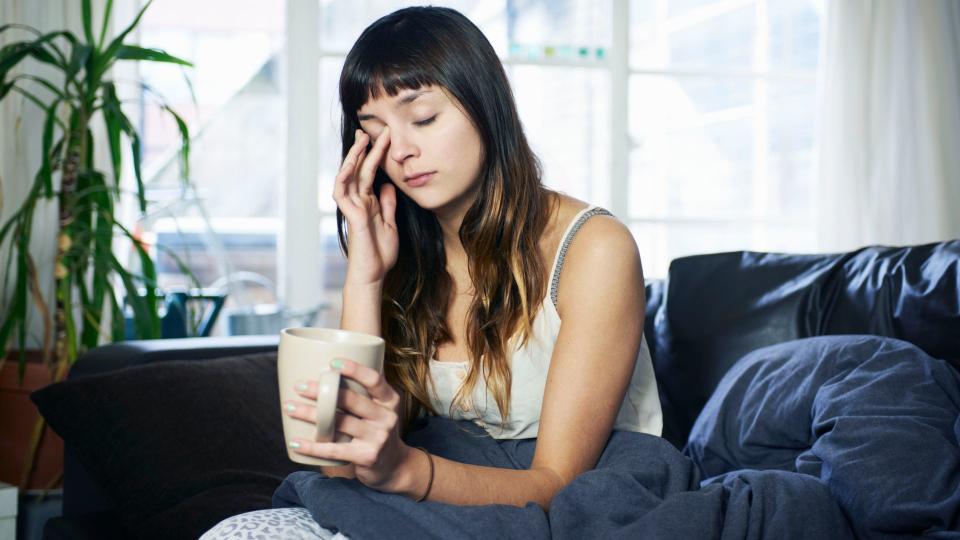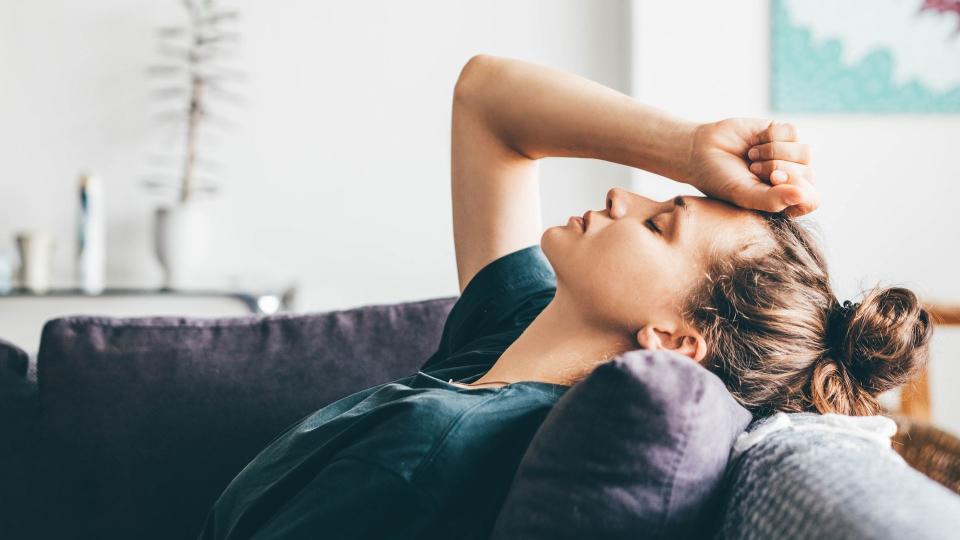Is this the reason we're all so exhausted right now?

It's a joke as old as time that men can't multitask, but they could be on to something, as psychotherapist Anna Mathur explains that our obsession with doing ten things at once could be the reason we're so worn out all the time.
"When we multitask, we think we're being super-efficient," explains Anna. "You feel productive when you're running the kids' bath or making dinner and getting emails done at the same time, but working like this actually takes far more energy for our brains," she continues, explaining why as women we often feel exhausted.
"Multitasking is an absolute con because we can't do two things at once," Anna adds. "Our brain ends up using a lot of energy to quickly keep switching focus between the two tasks at hand and it takes a lot from us.

"We're exhausting ourselves without even realising it," Anna says of why we're tired all the time.
"We think we're saving time and energy when actually we're less likely to do either thing well when we're multitasking. So I encourage people to try and be single-minded. Don't try and do two things, because you probably won't do either well."
You may also like
I had severe burnout – this is what helped me recover I had severe burnout – this is what helped me recover
Many of us are guilty of 'quickly' checking our emails on the train to work, or even while we're watching TV in the evening, and Anna explains that this spells trouble for our mental health, too.
"We often don't have good boundaries around our working hours because it is so easy just to sit and watch TV and do a quick email," she laments. "We think we're getting ahead of ourselves for the next day and we're trying to make life easier for ourselves, but the opposite ends up happening because we're not giving ourselves time to rest."
Even a 'mindless' scroll when we're on the way to work or lying in bed could be making us more tired, Anna cautions.

"When we're on our phone consuming information, our bodies and our minds are processing everything we see, and trying to work out whether it's useful.
"We think it's mindless, and we think scrolling while on the sofa is restful, but actually it's stressful. You don't know whether you're going see a picture of a cute cat or a traumatic story of someone's cancer journey next. You don't know what's coming, so you're on edge.
"It's really unpredictable and our bodies are very aware of that."

So what can we do about the constant stress state we're in?
The answer lies with rest and self-care – but don't roll your eyes at the idea of being told to make time for yourself!
You may also like
I ditched my phone for a whole week – here's what I learned I ditched my phone for a whole week – here's what I learned
We're all busy and being told to indulge in self-care can often feel like another thing to add to your to-do list. A new stat from Lumea even revealed that women spend less than one per cent of their week on themselves, a fact which came as no surprise to Anna, who sees stress and anxiety among her female clients on a weekly basis.
"It's women that are often carrying the load around the home, and one per cent is not enough when we're giving out so much," she said.
"Women often feel a sense of guilt around doing things for themselves and feel the need to earn rest.
DISCOVER: Burnout: How 5 days disconnected from the world changed my life
"We go to work and when we get back there's stuff to do at home and we're giving out for the majority of our life and that's become the norm," she continues.
"Women don't spend time on themselves because there's guilt and shame around meeting our own needs. Many of us believe that to be a good person is to always be giving out. And actually, it's just not sustainable.
"In our modern day world, we work towards a state of collapse. We do everything up until the last minute and then we flop into bed in exhaustion and it's just not serving us well.
"A lot of us are living like we're being chased," she adds. "We're running around our own homes and we don't realise quite how stressed that is making our nervous systems."
How can we make time for ourselves?
"We need to find ways to honour and respect ourselves because really this is about self-respect," says Anna. "We need to find ways to meet our needs and to get more rest before we collapse – and then maybe we won't have to collapse!"
1. Embrace boredom
"It's become so normal to constantly be giving ourselves stimulation and information. We've lost the beauty of being bored, but being bored is really important for our brains," Anna says.
"Make simple swaps to add boredom to your life, such as not using your phone or listening to music on the train or bus. Challenge yourself to add some pauses back into your life to calm your nervous system down."

Anna notes that sometimes we try to escape boredom because when we allow our brains to quiet down, we start feeling things. "Instead, acknowledge your feelings, pause and recognise, 'I actually feel really upset about this thing that happened last week.'
"You've busied your way out of that feeling but feeling is productive. It means that that emotion isn't going to get so stuck."
READ: The mini reset that helps me recover from my fast-paced life
2. Reframe self-care
Being told to take a bath or meditate when you've got no time to even pause for breath is frustrating, but Anna emphasises that self-care isn't about what we do, but instead what it gives you.
"We sometimes have these restrictive ideas, but self-care is ultimately about meeting needs. It might be putting a boundary in around what time you reply to emails or it might be offloading to a friend and just having your feelings validated.
"Hydration is another self-care act, because actually when we're not meeting those basic needs such as drinking, we're in low-level stress. Our body is depleted and our nervous system is stressed when we're dehydrated."

Anna explains that meeting these simple needs can help us feel happier as they make us feel safe.
"Starting to recognise and meet our needs and slowing down a bit means that we're more available to experience the things that bring us joy that are already there that we don't see when we're running past them."
READ: How a 10-day digital detox totally changed my life
3. Never overlook an opportunity for rest
Many of us are guilty of filling every free minute with tasks and admin, but if you have the chance to do nothing for five minutes, Anna implores that we take it.
"If you're going out for the day and your phone had 5% charge, you wouldn't think, 'There's no point in plugging it in for 10 minutes,' you'd take those 10 minutes," she says.

"We don't overlook the opportunity to charge our phone and therefore don't overlook five minutes on the sofa. It's a way of telling your body and your nervous system that you're safe."
How will making time for ourselves make us happier?
If we make time for ourselves, Anna says we will have more ability to enjoy life and be present.
"Life can change in a moment, curveballs come at us and when these hard things happen, all we want is the simple things.

"It's only then that we realise what's important. It's an amazing thing to start realising what is important before it's all in jeopardy."
Making time for ourselves reinforces our self-worth, with Anna sharing: "It increases confidence, joy, and self-esteem. The more rest you get, the more you'll start actually valuing it and seeing that it isn't an indulgence."
Follow Anna on Instagram for more advice, and visit our HELLO! Happiness hub for easy ways to be happier




